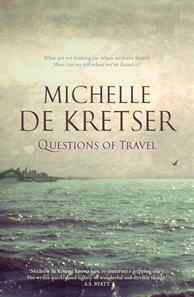 A review of Questions of Travel by Michelle de Kretser. Published in Australia by Allen and Unwin.
A review of Questions of Travel by Michelle de Kretser. Published in Australia by Allen and Unwin.
Questions of Travel was one of the most awarded books of 2013. It won the Miles Franklin, Australia’s premier literary award, as well as the Prime Minister’s Award for Fiction and the Association for the Study of Literature’s Gold Medal.
So I approached it with great anticipation, and in some ways, like most travel experiences, I was rewarded. However, just as resorts never quite live up to the brochures, this book lacked something for me.
It is a massive venture, spanning 40 years in the lives of two people: Laura, an Australian woman who becomes a travel writer; and Ravi, a Sri Lankan, whose family and life is torn apart in the civil war.
For the majority of the book, their stories run in parallel chronologically, with the reader wondering if they would ever meet. They finally do on page 369, but nothing substantial develops. This is not going to spoil the reading for anyone—I think it is better to be prepared for the anticlimax.
There is much to enjoy in the reading. Kretser has a sharp eye and wit. As Laura is my age and grew up in the same city, the observations of place and culture resonated deeply. She describes Sydney in vivid glimpses: “the rain fell in sheets there and so did the light… summers: the houses shut against the heat all day, then flung open at both ends so the southerly could walk through.”
There are some insights into workplaces also, introduced with a quote from Adrienne Rich used at the beginning of a section: “To work and suffer is to be at home. All else is scenery…” For example, Laura’s workplace goes through some restructuring, announced by their millionaire owner from an eco-resort in Brazil who has decided to cancel an elephant polo game in Kenya in light of financial stress. There are foul distortions from human resources, phrases like: “redundancy is another word for opportunity”, the need to “remove dead wood”, “we need to keep our thinking flexible”, the need to “show leadership in times of change”.
However, this is a book primarily about travel and our modern obsession to see new places, to experience change, because we (often ungratefully) have the resources to do so. It examines travel from every whim, including a caustic examination of tourist Bali: “Rip-offs and tacky nightclubs and pi..ed footballers at every turn”; and a cynical view of eco-adventure tourism, ‘Realanka’, where tourists willingly subject themselves to a couple days living like those who cannot afford to play at being poor.
The tone of the book is revealed in this quote from one of the characters:
‘Then you read something in a book and realise foreigners look at us just the way we look at them and…’ But the chasm revealed by this crack was too dizzying to explore.
This is precisely the territory that Kretser does want to explore.
Through Ravi, we also get a poignant look at a different form of travel: what it means to be an asylum seeker. Luckily for Ravi, a well-meaning ex-pat flew him into Australia, so he could live freely and legally work while applying for asylum, unlike those who travel here by boat.
There is also mention of the “unwilling travellers”, soldiers and those made homeless by war. Laura’s friend Theo makes the comment: “Now the world is full of people who don’t belong where they end up and long for the places where they did.”
Ravi also identifies the source of much travel and other searches for meaning, his wife made a vow that he takes up, “I resolve not to live my life in vain”.
Ironically, it is the vanity of Laura and Ravi’s choices and recklessness and lack of depth of relationship that most frustrates me about this book.
There is a great story here, and some wonderful writing, but ultimately I felt that the book lacked heart and soul. I couldn’t find one character that I liked or had sufficient empathy to cross the gulf of my lack of concern about what happened to them.
Judging by the praise and awards, I am in the minority although other reviewers have also mentioned the inconsistency and the gaps. Perhaps, like travel, it is up to the tourist/reader to determine the worthiness of the journey and the destination.
KARA MARTIN is the Associate Dean of the Marketplace Institute, Ridley Melbourne, has been a lecturer with Wesley Institute and is an avid reader and book group attendee. Kara does book reviews for Hope 103.2’s Open House and Eternity.
Email This Story
Why not send this to a friend?



